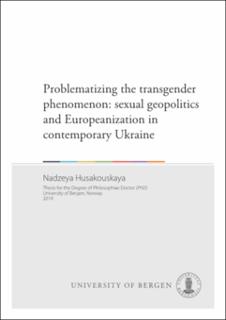Problematizing the transgender phenomenon: sexual geopolitics and Europeanization in contemporary Ukraine
Doctoral thesis

Åpne
Permanent lenke
https://hdl.handle.net/1956/20602Utgivelsesdato
2019-02-22Metadata
Vis full innførselSamlinger
Sammendrag
This dissertation explores the emergence of the transgender phenomenon within professionalized transgender and LGB activism in contemporary Ukraine. I explore how the transgender phenomenon has been formed within professionalized transgender activism as a particular object for thought and problematized. I investigate the production of “transgender” as a problematized phenomenon at the intersection of three intertwined frameworks: (1) local legal and medical regulations, (2) local professionalized transgender and LGB activism with its external conditionality imposed by donor agencies and “Western” discourses, and (3) an ongoing geopolitical process of Europeanization which involves negotiations over belonging to “Europe”. The analysis has borrowed from governmentality studies, notably the concept of problematization, and scholarly literature on Europeanization, paying particular attention to the instrumentalization of sexual diversity and the transfer of ideas (both seen as indispensable parts of Europeanization). I position my research in relation to transgender and LGBT studies on the one hand, and Russian and Eastern European (post-socialist) area studies on the other. I lean on a conceptual vocabulary developed by scholars who have problematized the construction of “Central and Eastern European” and/or “post-Socialist” spaces from an explicit or implicit post-colonial stance, as well as scholars who have critically investigated sexual politics in “Eastern and Central Europe” in the context of EU enlargement. I ground my research in problematization as a methodology and use qualitative research methods to collect data. Therefore, the study is based on a combination of interviews, participant observations, as well as texts and documents, including transgender archive material from Ukrainian LGBT NGOs. Using this data, I investigate how the transfer of ideas from “West” to “East” pertaining to (trans)gender issues and activism is interwoven with current global and local geopolitical interests and implicated in East/West dynamics. Importantly, the research also pays attention to the ruptures in discourses and practices that occur in the process of translation of globalized approaches into local settings.
